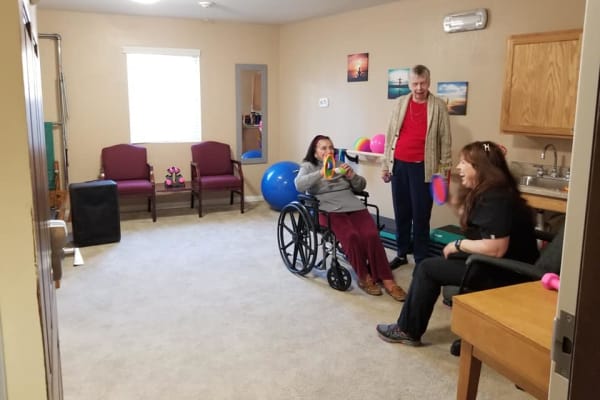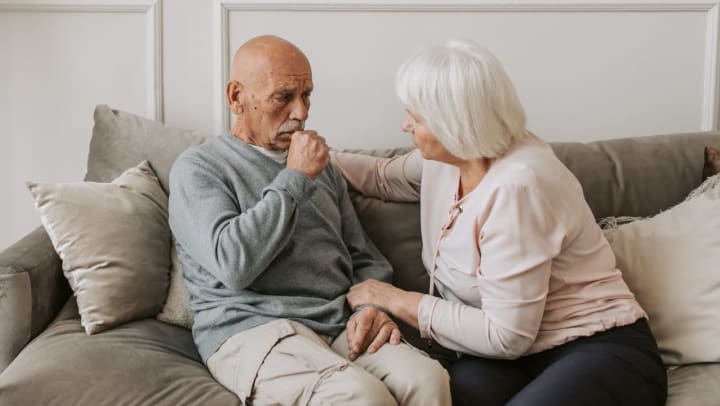Pneumonia in Elderly: Symptoms, Causes, Treatment & Prevention
Pneumonia is an infection of the lungs that is caused by bacteria, viruses, or fungi, according to Johns Hopkins Medicine. The way it affects individuals varies; some patients are able to recover at home relatively easily, while other patients require emergency medical attention. According to the CDC, in 2018 in the United States, “1.5 million people were diagnosed with pneumonia in an emergency department.”
Often time with pneumonia, it’s complications from the illness that can be the most deadly. Unfortunately, the elderly are typically much more at risk of not only contracting pneumonia, but developing complications from the disease, many of which can be fatal. Here’s what you should know about pneumonia in elderly, and how to protect your loved ones from pneumonia.
Pneumonia Symptoms in Seniors
There are a variety of symptoms that - if observed - could signify pneumonia in the elderly. Here are some common pneumonia symptoms in elderly adults:
-
Lack of appetite
-
Confusion or mental state or delirium
-
Extreme weakness
-
Unsteady on their feet
-
Urinary incontinence
-
Decline in existing health conditions
-
Other signs of sickness (cough, chest pain, wheezing, etc), or more classic symptoms of pneumonia (listed below)
Symptoms of pneumonia in elderly often present themselves more subtly, and can be difficult to identify, which can lead to delayed diagnosis. If you observe any of the above symptoms in an elderly friend or relative, or just suspect that something is not quite right in relation to their health, you should seek medical attention.
Classic Symptoms of Pneumonia
The symptoms mentioned above are quite different from what one might expect as a typical pneumonia symptom - or pneumonia symptoms as they would present in a healthy adult. Here are classic symptoms of pneumonia that you should also be aware of as a potential indicator or pneumonia in seniors:
-
Deep cough
-
Shortness of breath, rapid breathing, or difficulty breathing
-
Chest pains
-
Fever and chills
-
Excessive fatigue
What Causes Pneumonia in Elderly?
As we age, our immune systems tend to weaken, which automatically puts elderly adults at a higher risk of disease, and at higher risk of responding poorly to a disease that otherwise would be treatable.
When it comes to what causes pneumonia in elderly, there are two primary causes: situational-based onset (caused by germs), or aspirational-based onset.
In situational-based onset of pneumonia, the disease is acquired from a place, either community-acquired pneumonia (CAP), which is pneumonia that’s contracted outside of a healthcare facility, or healthcare-associated pneumonia, which is pneumonia that’s contracted inside of healthcare facility. This is the more common way that pneumonia is contracted.
In both of these situations, it’s a specific germ (either bacteria, virus, or fungi) that causes pneumonia in the elderly. Germs that are known associated causes of CAP include: Streptococcus pneumoniae bacteria, Haemophilus influenzae bacteria, the flu virus, and the COVID-19 virus.
Another way that the elderly can come down with pneumonia is via aspiration pneumonia, which is what happens “when you inhale things like food, saliva, or vomit into your lungs” (Healthline). This is less common, but still potentially very dangerous to the elderly.
Treatment of Pneumonia
Treatment of pneumonia in seniors will vary depending on the extent of the disease and any complications that they may be suffering. Some cases of pneumonia in the elderly can be treated at home, with traditional methods like rest, lots of fluids, OTC medications to relieve symptoms and discomfort. If the contracted pneumonia was caused by bacteria, the prescription and use of an antibiotic can help with treatment. If the contracted pneumonia was caused by a virus, it can't be treated with antibiotics, but an antiviral may be prescribed.
If the pneumonia has progressed beyond home treatment, or the elderly patient is experiencing complications, it may be necessary to seek hospitalization and more in-depth treatment, such as oxygen therapy, extra fluids, and monitoring and testing (blood tests, x-rays, cultures, etc). Healthcare facilities, as well as Assisted Living Communities with a team of established medical professionals, like Lakeview Terrace are the best place for seniors with pneumonia to be to give them the best chance of full recovery.
Recovery from Pneumonia
Most seniors are able to recover from pneumonia - either at home or with the help of a healthcare facility - but factors like existing health conditions and overall general health could impact how long recovery takes. A fairly healthy senior may recover in a week from pneumonia, but pre-existing health conditions can stretch recovery to weeks if not months.
It’s also common that pneumonia symptoms in elderly may go away and reappear, and pneumonia is highly likely to recur, so it’s vital to stay on top of treatment and ongoing monitoring.
Pneumonia Prevention
While pneumonia can usually be treated, there are cases where it can be deadly, especially for elderly adults. And, as is usually the case, prevention is the best cure, so take the necessary steps to help the seniors in your life prevent development of pneumonia.
One of the best ways to do this is by staying on top of yearly vaccinations, as well as maintaining an overall state of good health. Here are some of the best pneumonia prevention tactics for the elderly:
-
Pneumococcal vaccinations
-
Yearly flu vaccinations
-
Good overall health, including a healthy diet and lots of rest
-
Limiting traveling
-
Wearing a mask
Final Thoughts
Despite the variety of ways pneumonia can impact the elderly, and the varying responses to the disease, one thing is certain: seniors have a heightened vulnerability to pneumonia. Therefore, it’s important that the elderly have the information they need to stay healthy, stay safe, and engage in preventative measures to help protect them from pneumonia. So much of this is being proactive, so use the tips above to take care of yourself and your family starting today!
Pneumonia Care and Prevention at Ridgeline
At Ridgeline, you can feel assured that your elderly loved one will receive the best care and treatment. We specialize in dealing with illnesses and how they specifically affect elderly individuals, and pride ourselves on providing efficient, top-of-the line pneumonia treatment plans for our residents. Contact our Community Team to learn more about pneumonia care and prevention at Ridgeline.


